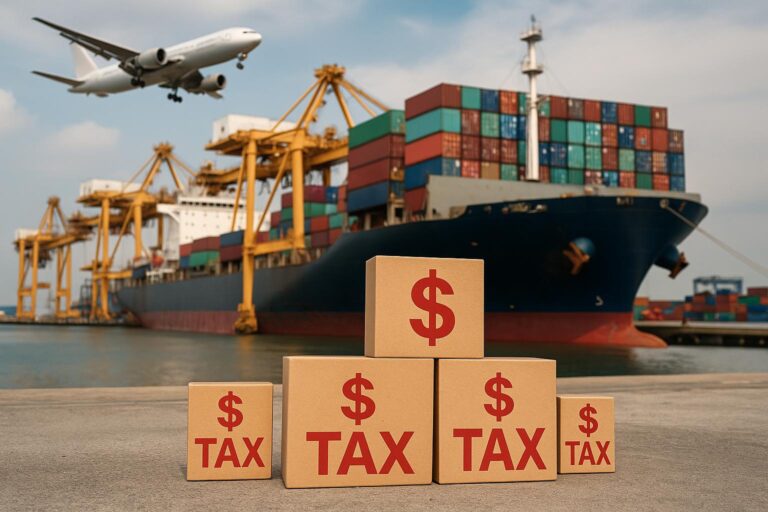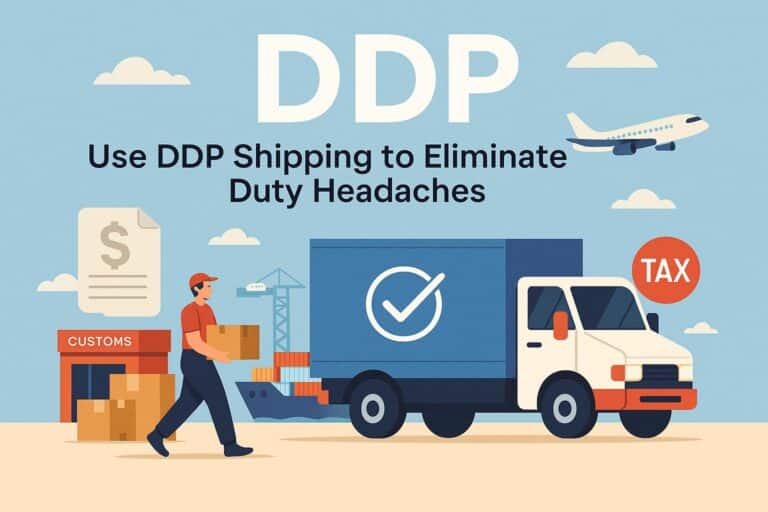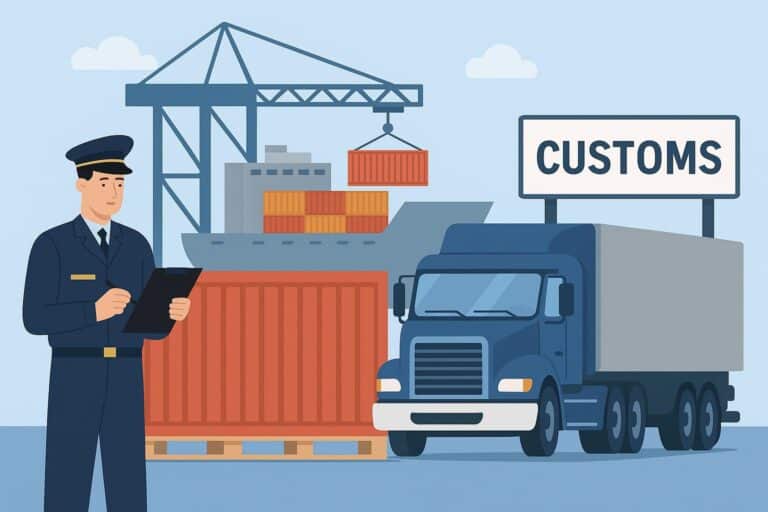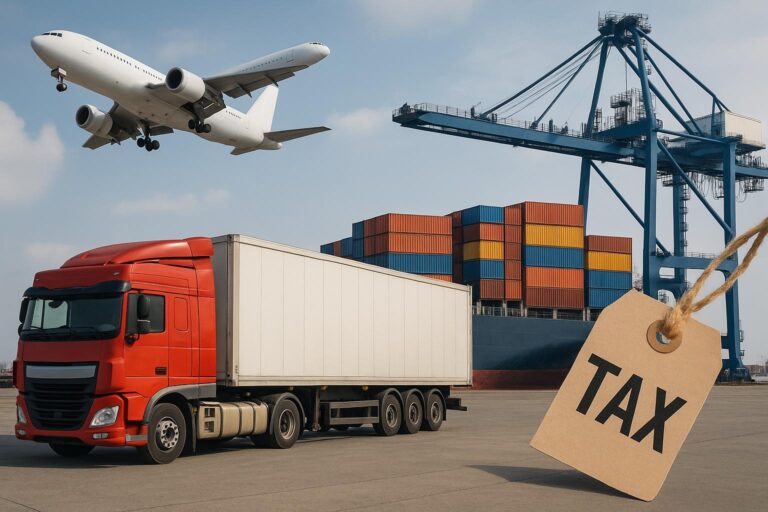Reliable & Cost-Effective Shipping from China
Tailored Logistics Solutions for Your Business
How to Reduce Import Duty When Shipping from China to the USA
- L. Liu
Importing goods from China to the USA? Don’t let high import duties eat into your profits. Whether you’re a small business or an established importer, understanding how to legally reduce customs duty can help you save money and stay compliant with U.S. import regulations. In this guide, we’ll break down practical strategies, cost-saving tips, and shipping methods like DDP (Delivered Duty Paid) that simplify your process. Additionally, we’ll explore the use of bonded warehouses as a strategy for managing cash flow by deferring import duties.

Introduction to Importing from China
Importing goods from China can be a complex process, involving various regulations, customs duties, and shipping costs. As a US importer, it is essential to understand the import regulations, leverage free trade agreements, and work with a licensed customs broker to ensure compliance and minimize costs. With the right knowledge and expertise, importing from China can be a lucrative business opportunity. Key terms to keep in mind include customs duty, import duty, and harmonized tariff schedule.
Why Understanding Import Regulations Matters
Navigating the intricacies of importing goods requires a solid grasp of the rules and regulations set forth by customs authorities. Leveraging free trade agreements can significantly reduce import duties, making your business more competitive. A licensed customs broker can be an invaluable partner, helping you stay compliant and avoid costly mistakes. By understanding the harmonized tariff schedule and accurately classifying your products, you can ensure that you are paying the correct amount of duty and taking advantage of any available duty exemptions.
Understand What Import Duty Includes
When you bring goods into the United States, you’re typically subject to several charges:
Import duty / customs duty
Customs fees and handling fees
Taxes (depending on product type)
Additionally, the merchandise processing fee and harbor maintenance fee can impact the total cost of importing goods, though they are relatively low compared to overall import expenses.
The U.S. Customs and Border Protection (CBP) uses the Harmonized Tariff Schedule (HTSUS) to classify goods and determine duty rates. The amount you pay depends on:
The HS Code classification
The declared value of the shipment
The shipping costs included in the transaction
For example, choosing CIF (Cost, Insurance, Freight) over FOB (Free on Board) may increase your dutiable value.
Classify Products Correctly with HS Codes
One of the biggest mistakes importers make is incorrect classification of goods. Each product must be assigned the right HS Code, which determines the duty rate and whether any duty exemption applies.
A licensed customs broker can be an invaluable partner. Customs assigns duties based on the classification of goods, assessing the shipment to ensure compliance with US laws and regulations before assigning a tax.
Tips:
Use official HTSUS tools or hire a licensed customs broker to verify your codes.
Be specific on your commercial invoice or proforma invoice.
Avoid mislabeling – CBP may reject your entry or apply penalties.
Leverage Free Trade Agreements (FTAs)
Although China does not have a direct FTA with the USA, in some cases you can still benefit:
If your goods are assembled in a foreign country with an FTA (e.g., Mexico under USMCA)
If components are sourced from countries under the Generalized System of Preferences (GSP). Legislative efforts targeting certain countries like China can impact duty exemptions.
Ask your freight forwarder or customs broker if your shipment qualifies for reduced or zero import tariffs.
Use DDP Shipping to Eliminate Duty Headaches
Delivered Duty Paid (DDP) shipping is one of the most effective ways to reduce hassle and avoid surprise import duty charges. DDP shipping ensures that the seller takes responsibility for all costs, including shipping, duties, and taxes, and delivers goods to your door. It is crucial to ensure that payment for duties and customs fees is handled correctly to avoid any delays or additional charges.
What is DDP?
DDP means the seller (or their freight forwarder) handles customs clearance, pays duty, and delivers goods to your door. You don’t deal with customs, brokers, or unexpected bills.
Benefits of DDP:
Full visibility over total landed cost
No need to hire a customs broker
Avoid import delays due to incorrect paperwork
Works for express service, air freight, and sea freight
Many freight forwarders in China offer DDP service to the USA, especially for larger shipments or high-duty goods.

Use a Bonded Warehouse to Defer Duty
If you’re not ready to distribute your goods immediately, storing them in a bonded warehouse can help delay duty payments until release. Under certain conditions, goods stored in bonded warehouses can even enter duty free, helping manage and defer costs associated with import duties.
Ideal for bulk or seasonal inventory
Useful for re-exporting goods with potential for duty drawback
Requires formal documentation and coordination with U.S. customs authorities
Claim Duty Drawbacks for Re-exported Goods
Under U.S. law, you may be eligible for a duty drawback—a refund of up to 99% of the import duty paid—if the goods are:
Re-exported unused
Destroyed under customs supervision
Used in manufacturing goods that are then exported
You’ll need:
A formal entry record
Proof of export
Help from a licensed broker or drawback specialist
Legally Reduce Declared Value
CBP calculates duty based on the dutiable value of your goods. While under-declaring is illegal, you can reduce costs legally by:
Separating freight, insurance, and export fees from the product value
Providing accurate but conservative product pricing. Improper oversight in trade compliance can lead to significant costing issues for importers, including fines, penalties, and additional expenses such as storage charges if goods are detained.
Using transaction value method when possible
Consult a customs broker to make sure your valuation meets U.S. customs regulations.
Understand Entry Types: Formal vs. Informal
Informal entry: For low-value goods, often under $2,500, simpler process, lower or zero duty
Formal entry: Required for high-value or commercial goods; you must pay duty and follow full compliance steps. Accurately classifying items in formal entries is crucial to avoid penalties or delays, and hiring customs brokers can aid in this process.
Businesses should always stay informed on customs regulations to avoid shipment holds or penalties.
Customs Clearance Process
The customs clearance process involves several steps, including the submission of required documents, such as a commercial invoice, packing list, and bill of lading. A customs broker can assist with the clearance process, ensuring that all regulations are met, and duties are paid. The customs clearance process can be complex, and any errors or omissions can result in delays or fines. It is crucial to work with a reputable freight forwarder and customs broker to ensure a smooth clearance process. Important terms to consider include customs authorities, customs clearance, and duty exemption.
Accurate documentation is key to a successful customs clearance. Your commercial invoice should clearly state the value, quantity, and description of the goods. A packing list provides details on the contents of each package, while the bill of lading serves as a receipt for the shipment. A customs broker can help you navigate these requirements, ensuring that all paperwork is in order and that you are taking advantage of any available duty exemptions. By working with experienced professionals, you can avoid potential delays and ensure that your goods arrive on time.
Learn more:
What Does CPT Term Mean in Shipping? (2025 Guide)
Documents Required to Import from China (2025 Guide)
DDP vs CIF vs FOB: Which Is Best for Your Business in 2025?
Delivered Duty Unpaid (DDU): What It Is and How It Works (2025 Guide)
EXW (Ex Works) Incoterms 2025: Essential Guide and Updates
FCA Incoterms 2025 Guide: Meaning, Shipping Terms, and Responsibilities

Border Protection and Regulations
Border protection and regulations are critical components of the import process. The US Customs and Border Protection (CBP) is responsible for enforcing regulations and collecting duties on imported goods. Importers must comply with specific rules, such as marking requirements, country of origin, and restricted items. Failure to comply can result in fines, penalties, or even the seizure of goods. A licensed customs broker can help navigate these regulations and ensure compliance. Key terms to keep in mind include border protection, personal use, and us importer.
Compliance with CBP regulations is essential to avoid costly penalties. For example, goods must be properly marked with their country of origin, and certain items may be restricted or require special permits. A licensed customs broker can help you understand and comply with these specific rules, ensuring that your shipments are processed smoothly. Whether you are importing goods for personal use or for resale, staying informed about border protection regulations is crucial to your success as a US importer.
Country of Origin and Marking Requirements
The country of origin and marking requirements are essential aspects of the import process. The country of origin is the country where the goods were manufactured or produced, and it is crucial for determining duties and compliance with regulations. Marking requirements, such as labeling and packaging, must also be met to avoid fines or penalties. A customs broker can assist with determining the country of origin and ensuring compliance with marking requirements. Important terms to consider include country of origin, harmonized system, and certain electronics.
Properly identifying the country of origin is vital for calculating the correct duties and ensuring compliance with US regulations. For instance, certain electronics may have specific marking requirements that must be met to avoid penalties. A customs broker can help you navigate the harmonized system and ensure that your goods are correctly labeled and packaged. By adhering to these requirements, you can avoid potential fines and ensure that your shipments are processed without delays.
Calculating Dutiable Value
Calculating the dutiable value of imported goods is a critical step in the import process. The dutiable value is the value of the goods that is subject to duties, and it is typically based on the transaction value, including the price paid for the goods, plus any additional costs, such as shipping and insurance. A customs broker can assist with calculating the dutiable value and ensuring compliance with regulations. Key terms to keep in mind include dutiable value, goods valued, and specific rules.
Understanding how to accurately calculate the dutiable value of your goods is essential to avoid overpaying on duties. The dutiable value includes the transaction value of the goods, as well as any additional costs such as shipping and insurance. A customs broker can help you navigate the specific rules and ensure that your goods are correctly valued. By accurately calculating the dutiable value, you can ensure compliance with customs regulations and avoid unnecessary costs.
Hire a Licensed Customs Broker or Freight Forwarder
Working with an experienced customs broker or freight forwarder can help you:
Accurately classify products
Provide detailed information about the contents of a shipment for compliance with customs regulations
Stay compliant with customs authorities
Reduce delays at the border
Minimize unnecessary duty charges
These experts can also help navigate restricted items, border protection procedures, and importing goods in bulk or for resale.

Final Tip: Stay Compliant and Plan Ahead
While cutting costs is important, compliance is key. Always:
Maintain detailed documentation (invoice, HS code, value breakdown). Gather important documents, such as the Certificate of Origin, to ensure accurate classification and cost estimation.
Avoid importing restricted items without proper licenses
Plan your logistics and customs strategy before shipping
Conclusion: Smart Strategies = Lower Import Costs
Reducing import duty when shipping from China to the USA requires more than just finding low-cost suppliers. With strategies like DDP shipping, bonded warehousing, duty drawback claims, and expert classification, your business can:
Save money
Avoid penalties
Ensure smooth delivery to your customers
Whether you’re importing certain electronics, clothing, or bulk products, the right shipping and customs strategy can make a massive difference in your bottom line. Additionally, effective international business strategies can facilitate cross-border transactions and manage multiple currencies, simplifying the financial aspects of conducting business internationally.
Frequently Asked Questions (FAQ)
What’s the easiest way to reduce import duty?
Using DDP shipping ensures your duty is paid by the exporter, giving you predictable all-in pricing.
How do I know if I’m overpaying on customs duty?
Check your HS Code and declared value. A customs broker can audit your past shipments.
Can I use duty drawback programs even for small businesses?
Yes, as long as you re-export or destroy goods under CBP rules and keep accurate records. Duties and processing fees for international shipments are often paid at the local post office.

